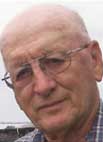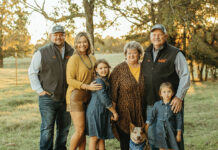
What began as a retirement pastime has grown into something a bit larger. “It’s a hobby that got carried away,” said Larry Hacker. After 28 years of military life, Larry and Nelda Hacker of Lincoln, Ark., have traded a life of travel with the United States Army for “done roving” roots raising Beefalo cattle. In 1986 they were presented with an opportunity to purchase two heifers as a start in the Beefalo business. Since then their operation has grown to over 100 head of cows, providing breeding stock to buyers from Minnesota to Texas and Colorado to West Virginia.
Beefalo cattle are a true hybrid, being a cross between domestic cattle and the American Bison. In the 1970s, experimental pioneers began crossing buffalo and cattle and were able to produce fertile, three-eighths Bison bulls. These bulls were collected artificially and a small group of producers began an upbreeding program in their own commercial cattle herds. The result is an official USDA recognized meat hybrid with two nationwide registry organizations. A registered fullblood Beefalo is three-eighths Bison, and five-eighths domestic cow. Through DNA blood typing, bulls are sold with verified genetic potential. Since the final product looks like commercial cattle and has the disposition of domestic cattle, many people don’t even realize they are looking at a Beefalo until the owner points it out. But the easiest way to uncover the Beefalo mystery is to look at the carcass traits. Beefalo meat is known to be low fat and cooks up much like venison and other game meats. The USDA meat label allows the meat to be sold as Beefalo, with a reputation as “the heart meat of America," due to its lower content of cholesterol compared to other red meats.
“Marketing is the bottom line," said Larry. In order to get widespread promotion of the breed, Larry and Nelda show cattle at the National Beef Expo in Louisville, Ky., in Missouri at the Ozark Empire Fair, as well as in Arkansas at the Arklahoma State Fair and the Washington County Fair. Talking to people at fairs to promote the Beefalo breed comes naturally to Larry. Both he and his wife enjoy traveling to the shows because it gives them a chance to expose children to the farm life. “It’s really kind of fun. It’s our chance to help kids understand farming,” they said. Through the local 4-H clubs and a heifer chain, over the past 20 years Larry and Nelda have helped 39 children have the experience of winning a ribbon in the show ring. Larry said he is concerned that our nation is about to lose the farming culture. He finds that many children who have a desire to work with cattle, as he put it, “lack parental support." In other words, many families lack the knowledge and resources to pass the farming gift on to the next generation.
“If we don’t start encouraging and helping young farmers, we are going to be importing our food as a nation. Agriculture is a lost art.” His experience with living in European countries with the Army and seeing the high cost of food products there bears this idea out.
“Fifty-six percent of American farms are owned by people over 65 years old. And investors keep buying up the land for other uses.” This makes land costs prohibitive to productive farming. This dismal forecast on the agriculture front is what keeps Larry and Nelda promoting the Beefalo breed and helping young farmers get a start through the heifer chain. The Hackers give a heifer to a young person with the proviso that he or she pass one heifer calf onto another young person. Along with the heifer comes mentorship to help turn one heifer into a lifelong love of living on the land.







